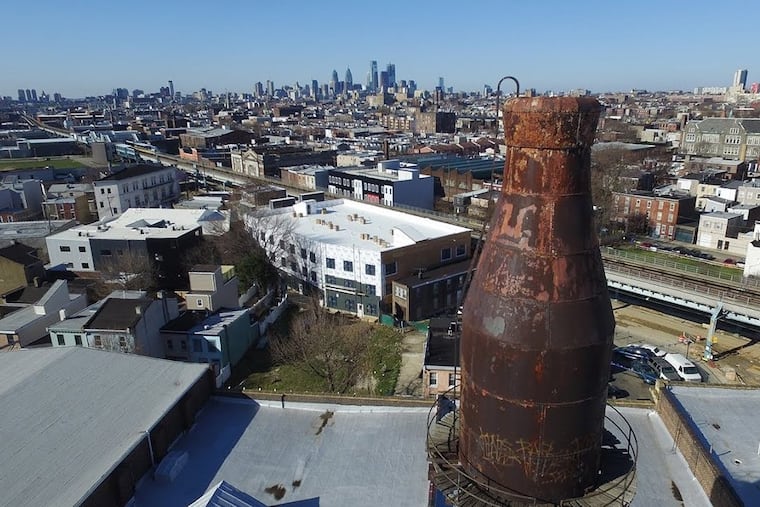Kensington's giant milk bottle gets historic designation
The iconic water tower, "an Eiffel Tower of Kensington," can't be knocked down without permission from the Historical Commission.

Kensington's giant milk bottle has been added to the city's list of historic places.
The Philadelphia Historical Commission voted unanimously Friday to give a historic designation to the former Harbison's dairy plant and its iconic water tower on Coral Avenue, meaning it can't be knocked down or significantly changed without the commission's green light.
Preservationist Oscar Beisert, who heads the Keeping Society of Philadelphia, described the 25-foot bottle as "an Eiffel Tower of Kensington." It's become an icon for the neighborhood, printed on pint glasses and T-shirts and used to promote local art shows and festivals.
The plant, composed of four connected buildings, dates to the early 1900s with brick, concrete and terra-cotta plaques with the letter 'H' for Harbison's.
The current owner of the building, Fozan Ehmedi, fought its designation, though he agreed the water tower should be protected. Ehmedi bought the plant to use as a warehouse for his grocery store, Cousin's Supermarket. The building is vacant and in serious disrepair, he said.
Ehmedi's attorney, William Martin, said the plant had been patched up several times over the years without any historical consideration and is now a "mish mosh" of bricks and concrete.
"Designate the water tower, don't designate the building," Martin told the commission.
But protecting the water tower means also protecting the building it sits atop, argued Jim Duffin, an archivist at the University of Pennsylvania, who spoke in favor of adding both to the list. If the building is demolished, the water tower becomes a "tombstone … a symbol of loss," he said.
"The milk bottle without the building completely destroys the context of what the milk bottle is," Duffin said.
The water tower was installed to feed the building's sprinkler system. The architect at the time suggested the steel tower take the shape of a white milk bottle.
The plant's founder, Robert Harbison, was an Irish immigrant who moved from Gwynedd Township to Kensington to open the plant at a time when people living in cities didn't have refrigeration or dairy cows. Harbison's delivered glass bottles twice daily across the city.
Thomas Harbison expanded his father's company into a regional dairy empire with five plants, pasteurizing and delivering milk, ice cream and butter. Only the Kensington plant remains.
The family sold the company in 1968 to Southland Dairy, which went bankrupt in the early 1990s.
At one point in the hearing, Martin questioned whether Harbison's business legacy, while impressive, really made the warehouse historically significant to the city.
"Much has been made about Mr. Harbison as a successful businessman in Philadelphia and I think we can say he was," Martin said. "I guess the question I would ask is whether that is a sufficient standard."
Beisert noted that a stretch of Aramingo Avenue was named after Thomas Harbison. "In Philadelphia," Beisert said. "they generally don't name streets after insignificant people."